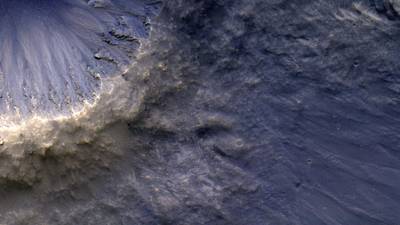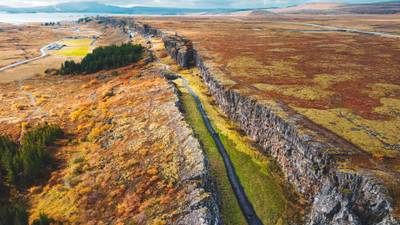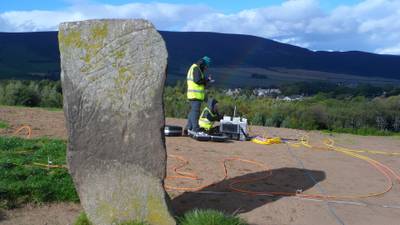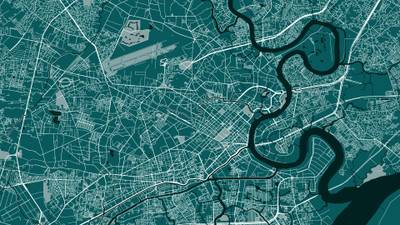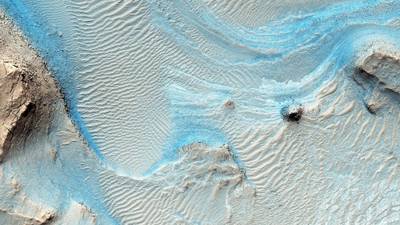Get an introduction to petroleum geoscience, 100% online.
Develop your understanding of geoscientists’ roles in petroleum exploration, development, and production.
In this Masters-level online short course, designed for non-geologists, you’ll learn about the tools, workflows, and vocabulary used by petroleum geoscientists, with an emphasis on risk and uncertainty in subsurface work.
By the end of this flexible course, you’ll understand:
- how geologists explore for oil and gas
- the main tools at their disposal
- the role of the geophysicist
- how to make prospect maps, and more.
Communicate with confidence
You’ll develop the knowledge to be able to communicate effectively with petroleum geologists, geophysicists, and petrophysicists in your industry.
Study with experts
You’ll learn with our School of Geosciences, which has been providing training in petroleum geoscience for over 50 years. We’re internationally regarded as one of the top vocational training providers for the energy industry.
Who can join this online petroleum geoscience course?
This distance-learning course is designed for graduates from any discipline.
The course is ideal learning for:
- graduates looking to enter careers in the oil and gas industry, or
- non-geologists working within the industry who want to understand the role that petroleum geoscientists play in exploration, development and production of a field.

Build credits towards a Masters degree
This short course is part of online:
You can use the credits you earn with this short course towards these MSc qualification.
What you’ll study
In this online course, you’ll study the role of geoscientists in petroleum exploration, development, and production.
You’ll get a grounding in the tools and techniques that they use.
You’ll cover aspects of geology, geophysics, and prospect evaluation to learn how geologists deal with uncertainty and risk during the exploration process.
You’ll learn about prospect maps, petroleum volumetrics, subsurface fluid flow, and the creation of static reservoir models.
You’ll also examine the key issue of communication between geoscientists and engineers.
You’ll cover topics including:
- Basic geology and geological nomenclature
- The petroleum system: geological controls on formation and accumulation of hydrocarbons
- Fundamentals of geophysical acquisition and data processing
- Defining plays, fairways and prospects; prospect mapping
- Dealing with uncertainty and risk
- Production geology and subsurface fluid flow
- Formation evaluation and interpretation
- Geological input into well completions (particularly in late field life).
By the end of this petroleum geoscience course, you’ll be able to...
-
Explain how geoscientists explore for oil and gas and the main tools at their disposal.
-
Produce a prospect map.
-
Calculate petroleum volumetrics.
-
Discuss subsurface fluid flow, and the creation of static reservoir models.
-
Communicate uncertainty and risk with petroleum geoscientists effectively.
Choose the University of Aberdeen for flexible online short courses

Learn anywhere
On smartphone, desktop and laptop, with no need for a student visa.

Flexible
Flexible hours and 24/7 access, so you can study when it suits you.

20% alumni discount
University of Aberdeen alumni get 20% off fees for this online course.
How you’ll study
Online learning
This distance learning petroleum geoscience course is delivered flexibly, 100% online.
You can learn with us anywhere, no student visa required, and manage your study hours to suit you.
Your teaching
This course is taught at Masters level.
Teaching is delivered through MyAberdeen, our online Virtual Learning Environment (VLE). It holds all the materials, tools and support you’ll need in your studies. Take a look around MyAberdeen.
You can access your learning materials on computer, smartphone and laptop, 24 hours a day. You’ll find a range of online resources available, including:
- videos, including practical demonstrations and a virtual fieldtrip
- pre-recorded video lectures
- quizzes
- reading materials
- discussion boards with your tutors and peers
- online access to our award-winning Sir Duncan Rice Library.
Your tutors
This course is delivered by our School of Geosciences.
You’ll learn from an experienced team of academics, many of whom have previous industry experience working for multi-national energy companies.
This course is assessed online.
You’ll be assessed throughout your course via:
- a contour mapping and STOIIP exercise (worth 20% of your final course grade)
- an essay (40%), and
- an end-of-course online test (40%).
Study hours
This course totals approximately 150 hours of study and assessment time. That’s around 10 – 15 hours per week.
This is an indicative guide to the time required for a typical student at this level to achieve the learning outcomes. This includes time for independent study, as well as teaching and assessments.
You can set your own study hours each week to cover the materials. MyAberdeen is available 24/7, so you can log in and study when it suits you.
Online lectures
This course is made up of eight learning modules. Each module features online pre-recorded lectures provided by subject-matter experts. Lectures total around 2-4 hours per learning module and can be completed at your own pace.
Activities at fixed times
There may be some activities that you have to attend at a fixed time, such as online meetings with your tutor or assessments with deadlines. But otherwise, you can access and work through the course at your convenience.
Our first-class support structure will ensure that you aren’t alone in your studies. You’ll have contact with your tutors via MyAberdeen and email. You can use social media and discussion boards to chat with your fellow students too.
We provide a wide range of services to support you in your studies and beyond:
- Careers and Employability Service
- Disability support
- IT support
- Library support
- Student Support Service – help with finances, wellbeing and non-academic issues
- Student Learning Service – study support, with advice sessions available
- Aberdeen University Students’ Association (AUSA) – run by students for students
- Toolkit – clever apps and free training that can make your study life easier
Wherever you are in the world, you’ll feel part of our very special Aberdeen learning community.
Your course coordinator

Dr Rachel Brackenridge
Rachel is a Senior Lecturer in our School of Geosciences.
With years of experience in the petroleum industry, she has a multidisciplinary understanding of the subsurface.
Rachel’s main focus has been on frontier basins and plays, as well as energy stability, and energy equality. Her current research examines the utilisation of the subsurface for intermittent and long-term energy storage.
View Rachel’s profileWhere this will take you
Towards a Masters
You’ll earn 15 credits at Masters level (SCQF Level 11) with this distance-learning course. You can use these credits towards online:

Masters in Oil and Gas Engineering
Join an accredited online Masters degree delivered from the Energy Capital of Europe. Master the skills and technologies you need to pursue a career in the upstream and downstream oil and gas industry.
View MSc Oil and Gas Engineering
Masters in Petroleum Engineering
Become a world-class petroleum engineer, ready to take up roles in the upstream oil and gas industry. Join our accredited online MSc in Petroleum Engineering, designed in partnership with industry.
View MSc Petroleum EngineeringCareers
Through this course, you’ll get an introduction to working in the subsurface, and develop a deeper understanding of the work of a petroleum geoscientist.
The course is designed to help you progress within or towards a career in the energy industry.
The knowledge you’ll gain is particularly valuable for non-geologists working in the oil and gas sector, in technical and non-technical roles.
Whatever your background, you’ll develop the ability to communicate effectively with petroleum geologists, geophysicists, and petrophysics within interdisciplinary teams in industry.
Continuing Professional Development (CPD)
Your employer or professional institute may recognise this course for CPD hours. Talk to your employer or institute to find out more.

Free career support
Access our free careers service while you study.
- 1:1 appointments
- CV checks
- Interview prep
- Job opportunities
Entry requirements
Entry requirements
We welcome students from all over the world.
This course has no formal entry requirements. You do not need to provide proof of your qualifications.
But you do need to check the entry guidance above to understand the level of teaching delivered, to decide if this course is right for you.
If you do not have qualifications from the UK, check the equivalent teaching level for your country.
Visa requirements
You do not need a student visa to study online with us.
English language requirements
Teaching is delivered in English.
You do not have to provide proof of your English language skills to join this course. But we want to make sure that you can use English well enough to study successfully.
Recommended level of English
For this course, we recommend the following level of English language proficiency.
These are our Postgraduate Standard requirements, and these are minimum scores.
IELTS Academic, IELTS UKVI Academic, or IELTS Online (not IELTS Indicator or IELTS General Training)
- 6.5 overall
- 5.5 for listening, reading and speaking
- 6.0 for writing
TOEFL iBT or TOEFL iBT Home Edition
- 90 overall
- 17 for listening
- 18 for reading
- 20 for speaking
- 21 for writing
- TOEFL DI code is 0818
Cambridge English: B2 First, C1 Advanced, or C2 Proficiency
- 176 overall
- 162 for listening, reading and speaking
- 169 for writing
LanguageCert Academic / LanguageCert Academic SELT
- 70 overall
- 60 for listening, reading and speaking
- 65 for writing
Oxford ELLT Digital – English Language Level Test Online
- 7.0 overall
- 5.0 for listening, reading and speaking
- 6.0 for writing
PTE Academic (online test not accepted)
- 62 overall
- 59 for listening, reading, speaking and writing
Skills for English: SELT
- B2 pass with merit
Duolingo – tests taken from 1 July 2024 onward
- 120 overall
- 95 for listening, reading and speaking
- 105 for writing
University of Aberdeen English Pre-sessional Programme (PSE)
- Pass
- Valid for one year. Refresher can be offered if out of date
Pre-sessional academic English preparation programmes undertaken at other UK universities
- Pass at an equivalent of 6.5 (C1)
- B2 in all four skills
- Certification must be within one year prior to the start of your course
For full information about language requirements, see our English Language Requirements page.
You will need access to:
A computer (PC, laptop or Mac) with an up-to-date operating system
Most teaching materials are smartphone- and tablet-friendly. But we recommend a proper laptop or desktop for completing assignments comfortably.
Reliable internet access
We recommend:
- a wired connection
- a minimum download speed of 2 Mbps so you can take part fully in live sessions.
Speakers or headphones
- We recommend a headset with built-in microphone and earphones if you’re likely to study in an environment with background noise.
- A webcam is optional, but you may like to use one for some interactive sessions.
Software
We’ll give you access to Office365 applications. This means you can use online versions of Microsoft Word, Excel, PowerPoint and OneDrive and install these programs on up to five personal devices.
If your course requires specialist software, we’ll provide you with access to this and a licence that lasts throughout your studies.
See our detailed IT requirements for more information.
When you study with us, you can expect a first-class support structure so that you’re never alone in your studies.
But learning online does mean you have to motivate yourself and manage your own time.
Your most important commitment will be time – the time to work through, reflect on and understand your teaching materials.
Before you start a course that involves a high degree of independent study, we recommend looking at the time you will be able to devote to your studies each week:
- Be realistic
- Create a weekly schedule as a guide
If you have any questions about studying online, get in touch with our friendly team. We’re here to help.
Fee payment
Your course fee needs to be paid in full before you start your course.
We accept payment via Visa Debit, Visa Credit and Mastercard.
Ways to save
You may be able to get help funding this course via:
- discounts – if any discounts are available for this course, they’ll appear in the section below
- employer sponsorship – we accept full and partial fee payments from sponsors.
Find out more about funding options.
Student card
All our students are entitled to a University of Aberdeen student card. This gives you access to a range of student discounts around the city and online.
Learning resources
Access to all the books and resources you need are included in your tuition fee. They’ll be made available to you online and you do not have to buy your own copies.
Printing
You may wish to set aside a small budget for printing, depending on how you like to work.
This course has no formal entry requirements. You decide if it’s suitable for you.
The course is delivered at Masters level. At this level, you’d usually have at least:
- a 2:2 UK honours degree (or equivalent) in any discipline, or
- relevant professional experience that supports this level of learning.

